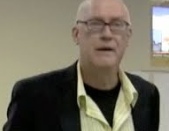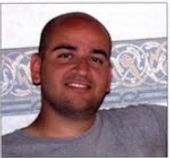Hypomanic Nation
 |
From discovering a nation to founding and settling it, hypomanics led the way.
|

Hypomania and the American ethos. "Up until 2003, only God could claim to have created life. The Almighty must now share that honor with a hypomanic American."
That provocative statement comes from the 2005 book, "The Hypomanic Edge: The Link Between (a Little) Craziness and (a Lot of) Success in America" by John Gartner PhD, which contends that America would not be what it is today without the hypomanic drive of the people who settled, founded, and shaped a nation in their image. Exhibit A is God’s partner in creating life, Craig Venter.
My New Book!

Purchase now.
Transforming the World

Readers may recall a June 2000 White House ceremony in which President Clinton announced a "tie" between two competing groups to sequence the human genome: the official government effort, the Human Genome Project (HGP) headed up by Francis Collins and a breakaway private venture bankrolled by a new company, Celera, run by maverick geneticist Craig Venter.
In fact, the tie was a political sham engineered by the White House with the collusion of both parties. Celera had actually run rings around the opposition, smoked them, waxed them, wiped the floor with their face. It wasn’t even close. Not only had Celera crossed the finish line well ahead of the HGP, it delivered a more complete genetic blueprint. To add insult to injury, the only way the HGP could even stay in the race was by scrapping its own plodding methods and game plan for Celera’s.
Craig Venter was a wild man from day one. As a kid, he liked to race his bike on the local airport runway as planes took off. In the Army, he frequently got on the wrong side of his superiors. On acceptance to a university faculty position, he wasted no time turning colleagues into enemies, then evinced surprise when they refused to grant him tenure. He arrived at the NIH and caught the attention of his hero, James Watson, but became disillusioned when the great man tactlessly treated him as a mere technician and publicly humiliated him in a Senate hearing.
Venter acknowledged to Dr Gartner that he probably has "a very mild case of manic depression." When the author described bipolar II to him, he replied, "That characterizes some pretty big stretches of my life."
Driven into the private sector, Venter in 1995 revolutionized microbiology by successfully mapping the H flu genome using a novel "shotgun" method. At the time, the HGP was in full swing. Three years later, with the support of Celera, Venter made the surprise announcement that he would map the human genome four years ahead of the HGP’s target date at one tenth the cost. As Dr Gartner describes it: "What psychiatrists call ‘impulsivity,’ entrepreneurs call ‘seizing the moment.’"
Venter added that Collins’ team should just quit now and stick to mapping the mouse.
A few days later he turned up uninvited at a HGP meeting and taunted the participants. One scientist wanted to slug him and another strangle him. But the affront energized the opposition and instilled in them a newfound sense of urgency. Meanwhile, Venter mobilized his troops with the charismatic élan of a battlefield commander. A colleague compared his efforts to high dives into empty pools, timed so that the water would be there by the time he hit bottom.
In the end, Venter nailed all his landings, a full five years ahead of HGP’s original schedule. Under the terms of the White House agreement, neither party was supposed to attack the other’s work, but embittered HGP scientists simply couldn’t help themselves. Even Mother Teresa would hate the guy.
Venter proved equally successful in alienating his financial backers. In 2002, Celera fired him and he went into a depression, only to bounce back as head of the privately-funded "Genesis Project," which effectively created life by building a virus from scratch. A team at the State University of New York at Stony Book had accomplished a similar feat shortly before, but their effort had taken three years compared to Venter’s 14 days.
Now science was truly playing God, for better or for worse, with the potential to transform the world or destroy it. It’s the kind of challenge that hypomanics live for.
An American Vision
In "The Hypomanic Edge," Dr Gartner argues that America’s greatness can be attributed to an abundance of mania lite genes. The type of people who were willing to risk everything to face an uncertain future in a new world, he says, had very different temperaments than the ones who stayed home. The three countries with the highest rates of mania – the US, New Zealand, and Canada – are all immigrant populations.
It started with Christopher Columbus, who claimed to have had a mystical revelation in which the Holy Spirit had given him the keys to the gates of the ocean. With the profits of his voyages he hoped to recapture Jerusalem. The Portuguese king dismissed his ideas as "fanciful" and a Spanish committee as "mad." When Queen Isabella finally decided to back him, Columbus – who referred to himself as Christoferens or Christ-bearer - outrageously insisted that he be elevated to royal rank as an Admiral and Viceroy, with 10 percent ownership of everything he found. He angrily refused to negotiate and packed his bags for France, presumably for a quick exit out of history.
Amazingly, the Royal Court caved in. Hypomanics would soon have a place to call home.
The first waves of English settlers were primarily religious dissidents. Puritan leader John Winthrop had experienced a life-changing mystical revelation following a period of deep depression, an awakening shared by many of his followers. In leaving England for Massachusetts, the Puritans saw themselves as not just fleeing Egypt but as establishing New Jerusalem. Ronald Reagan’s famous "City on a Hill" address borrows directly from John Winthrop.
But Dr Gartner also describes the Puritans as "venture capitalists of a sort" who risked their lives instead of money. Land and business opportunities were available to those daring enough to bet their lives on the outcome. Fellow hypomanics Roger Williams and William Penn added the notion of religious tolerance. An American ethos was being shaped.
America is Born

"Danger, Hypomanic on Board," could well be the other title of "Washington Crossing the Delaware." With him that historic night was Alexander Hamilton, most famous for being on the losing end of a duel with Aaron Burr. Biographer Ron Chernow describes Hamilton as "a volatile personality," and an "exuberant genius" who was prone to poor judgment and "prey to depression." Dr Gartner surveyed five of Hamilton's biographers without telling them the illness he was investigating. Even though only one biographer had suggested in his book that Hamilton may have had bipolar disorder, all of them overwhelmingly in the survey awarded the Founding Father very high marks for hypomania.
Soon after graduating from Columbia University in two years, Hamilton caught revolutionary fever. In one two-week period he spewed out the equivalent of a book in the form of 60,000 words of propaganda. During a raid, when everyone else had ducked for cover, Hamilton walked straight into an artillery bombardment. He soon caught the attention of George Washington and became his aide de camp, only to impulsively quit a few years later. At Yorktown, now with a battlefield command, he paraded his troops in front of British cannons. The British were too dumbstruck to open fire. Later in the battle, Hamilton led a reckless charge that turned out right for all the wrong reasons.
Hamilton was the main instigator of the Constitutional Convention, but one biographer described him during this period as "restless and depressed," and another "like he was on something." He delivered an impassioned six-hour speech, then walked out for good in disgust, unable to appreciate why the delegates couldn’t simply settle their differences and back his brilliant proposals. Nevertheless, once the document was ready for ratification by the states, Hamilton became its greatest champion, cranking out 51 of the 85 op-ed pieces collectively known as the Federalist Papers. He was also the political point man in winning over New York.
By the time Hamilton assumed his post as first Secretary of the Treasury, the new nation was on the brink of financial collapse. Hamilton’s inspired plan was to consolidate state debts and federal debts into one restructured national debt, paid off in monthly installments. The result was a strong and robust federal government that set the scene for a nation of capitalist go-getters, much to the consternation of Thomas Jefferson who envisioned a pastoral utopia. Fittingly, Hamilton is buried in a graveyard on Wall Street.
The American Dream

Ironically, the greatest robber baron of them all, Andrew Carnegie, was the son, grandson, and great grandson of Scottish revolutionary socialists. But, as Dr Gartner explains, it’s the temperament rather than the ideology of a revolutionary that is carried in the genes, and Carnegie possessed the former in abundance.
Working as a messenger boy, young Carnegie taught himself Morse code and Morse code transcription. He became a telegraph operator for four dollars a week and began entertaining dreams of "future millionairedom." Soon he became the protégé of Tom Scott, regional superintendent of the Pennsylvania Railroad. The young immigrant was moving on up.
Through Scott, Carnegie was made privy to some insider trading deals and was on his way to realizing his dream of millionairedom. In the 1870s, in the middle of an economic depression, Carnegie decided to make a name for himself in steel. Through a combination of bluster, bullying, and brilliance, he turned every disadvantage into an advantage, and ended up spanking his domestic and international rivals in the process.
Simply by building a manufacturing powerhouse, Carnegie could be considered a visionary. But he also entertained a messianic notion of human evolution in the form of social Darwinism. Unfortunately, his enthusiasm blinded him to capitalism’s worst inequities and the appalling way he treated his workers. Nevertheless, thanks to his efforts, steel was now a low-priced commodity that revolutionized industry and transportation. Consumer goods became affordable and living standards had nowhere to go but up. Moreover, Americans now had leisure time, giving rise to America’s most famous industry.
Thomas Edison thought the public did not have the patience to watch movies for more than 10 minutes. Clearly, he was not thinking big. It took a group of Jewish immigrants to take film from the nickelodeon to the silver screen. This included larger-than-life Louis Mayer, whose daily existence was the stuff of high drama and low comedy. When his doctor advised him to relax by taking up golf, Mayer wore out several caddies keeping five balls in play. "The heck with one-ball golf," he said.
Under Mayer, MGM became the symbol of Hollywood’s golden age, his movies lavishly crafted advertisements for the American dream. His son-in-law was David Selznik, whose father had left Russia on foot to escape the pogroms there. A free-spending womanizer and gambler, Selznick achieved immortality by producing "Gone with the Wind," only to throw it away after a nervous breakdown by closing down his studio and selling the film rights for a song.
Today, American movies account for 83 percent of world box office revenue. As Dr Gartner describes it: "John Winthrop predicted that America’s light would shine upon all nations of the world. He never could have imagined that it would shine through the lens of a projector … Could Hollywood have written a better ending?"
The American Conundrum
Dr Gartner contends that America is a hypomanic nation, a situation that confounds our European friends. Writes Dr Gartner:
They like our cheerful optimism, even if it seems naive. They appreciate our confidence, but not when it veers toward arrogance. They admire our inventiveness and creativity, even as they laugh at the wacky trends we follow. They envy our wealth, even as they decry our shallow materialism. They admire our can-do energy, but don’t understand why we can’t stop our engines and take long vacations as they do. How an advanced nation can be so ripe with religious zealots mystifies them. And our messianic streak scares the hell out of them, especially since the Iraq war.
But even American hypomanics can express fear and bewilderment. Perhaps more so, as we more than anyone truly know the dark side of our illness and the destruction it can bring down. The Vietnam War, for example, was a hypomanic nightmare micromanaged by a hypomanic President. And think of the American Civil War. When the South fired on Fort Sumter, shouldn’t someone have been saying, "Are you crazy, man? Don’t you guys know what you’re getting into?"
And spare a thought for the Native Americans, on the receiving end of our hypomanic excess.
Meanwhile, one doesn’t need to be a member of the religious right to wonder what has become of our New Jerusalem. Have we turned into Sodom and Gomorrah, best exemplified by Hollywood? A population out of touch with reality doesn’t ask these questions. (Conversely, the Republican Tea Party movement should be referred to by its more appropriate name as the Mad Hatter's Tea Party.)
But without those crazy genes, we would still be shivering in caves, afraid to go near fire. We may be headed to destruction or we may be on our way to salvation, but only the hypomanics in our midst could have brought humankind to this crucial fork in the road. Think on one hand of the likes of Craig Venter playing God. Think on the other of gene technology creating a possible heaven on earth. What have we got ourselves into? one may ask. But someone else energized by a vision of the future will enthuse, let’s get started.
Like it or not, there’s no turning back.
Check out John Gartner's website
April 23, 2005, reviewed Jan 17, 2011
 |
More famous people articles. |




